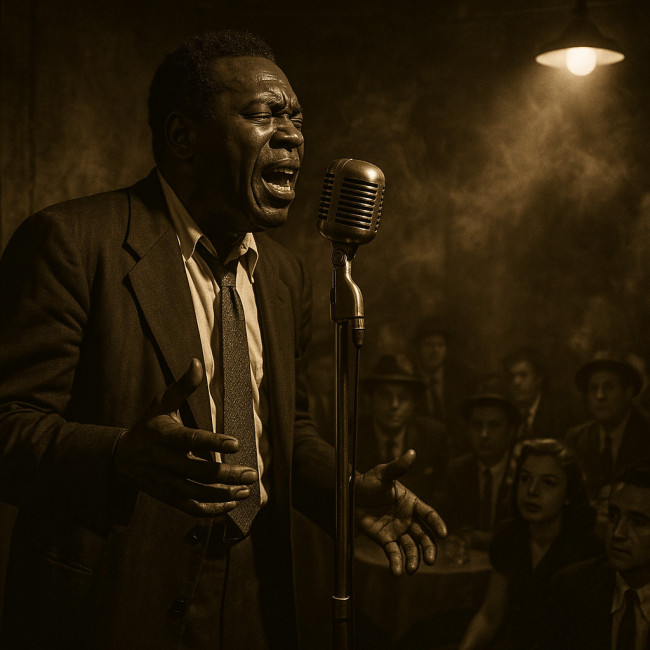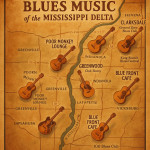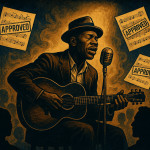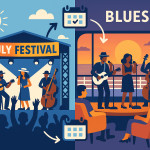Curating a signature blues repertoire: song selection that lands repeat bookings
A finely tuned blues repertoire transforms a one-off gig into a steady stream of engagements. Follow this roadmap to choose, refine and rotate songs so bookers remember your set and call you back—again and again.
Why your blues repertoire is your business card

Your set list is more than a sequence of songs; it signals professionalism, depth, and booking reliability. Talent managers browsing specialised blues-singer directories often decide in under 30 seconds whether your repertoire fits their event brief. A signature selection saves them time and elevates your profile over singers who rely on random requests.
Step 1 – Define the core of your signature sound
Map your stylistic pillars
- Regional colour – Delta, Chicago, Texas or British blues?
- Era focus – pre-war classics, 50's electric surge, modern fusion.
- Emotional temperature – raw lament, upbeat shuffle, or sultry slow burn.
Limit yourself to two pillars at first. A tight frame keeps your repertoire coherent and helps directory filters—explained in depth in how talent managers filter blues singers by metadata tags—surface your profile faster.
Audit existing bookings
Review past set lists and booking feedback to spot songs that consistently spark encores. Clip the lukewarm tunes and double-down on proven winners.
Step 2 – Balance classics, deep cuts and originals
Repeat bookers want the comfort of standards with a surprise twist. Allocate:
- 50 % essential standards—think “Sweet Home Chicago” or “Hoochie Coochie Man”.
- 30 % deep-cut gems that signal expertise (“You Don't Have to Go”, “Stone Crazy”).
- 20 % original material that threads your unique story through the set.
Rotate at least two songs per category every quarter to keep regular audiences engaged. When adding covers, verify clearance procedures via our legal shortcuts for blues cover licensing.
Step 3 – Structure an emotional arc
| Set Position | Song Type | Goal |
|---|---|---|
| Opener | Up-tempo classic | Instant familiarity, capture attention |
| Mid-set | Slow burner original | Show vocal nuance, deepen connection |
| Crescendo | Deep-cut shuffle | Spark dance energy, audience participation |
| Encore | Signature anthem | Leave a memorable hook, prompt re-booking |
Step 4 – Align repertoire to venue circuit expectations
Blues cruises, heritage festivals and intimate clubs each reward different song choices. Study demand data from regional blues circuits that recruiters scout first and adapt durations, lyrical themes and solo lengths accordingly.
Tempo and key diversity
- Keys: Mix at least four keys to avoid monotony and accommodate guest soloists.
- Groove: Alternate 12-bar shuffles with 8-bar slow blues and minor key ballads.
Step 5 – Future-proof your repertoire with audience analytics
After each show, log:
- Applause length (seconds)
- Merch spikes per song
- Set-list mentions in post-gig social tags
Songs scoring top-third metrics graduate to “evergreen” status; the rest enter a trial or retire list.
Step 6 – Capture your sound for digital proof
Bookers preview your act online long before contracts are drafted. Pair your refined set list with a showreel mixed to showcase dynamics (audio-mixing tweaks that recruiters notice). Use a microphone chain that flatters a blues voice for authentic tone.
Common pitfalls and quick fixes
- Over-reliance on 1-4-5 progressions – insert modal tunes or altered chords for colour.
- Lyric clichés – modernise verses or compose transitional vamps.
- Neglecting legalities – secure cover licenses early to avoid last-minute set changes.
FAQ
- How many songs should I keep in active rotation?
- Twenty-five well-rehearsed titles give enough flexibility for two hour-long sets while preventing rehearsal fatigue.
- Is it risky to include originals if the audience wants classics?
- No. Position originals after a crowd-pleasing standard; engagement dips are rare when the flow is right.
- What's the ideal song length for festival bookings?
- Four minutes. Festivals favour tight changeovers and broadcasters edit easier at this length.
- Should I adjust my key choices for different venues?
- Yes. Outdoor stages swallow low-mid frequencies; shifting songs up a semitone can restore presence.
- How often should I refresh my repertoire on directory profiles?
- Quarterly updates signal activity to ranking algorithms and reassure bookers you're performance-ready.
Test your repertoire savvy
Key takeaways
- Define two stylistic pillars to anchor your signature sound.
- Mix 50 % standards, 30 % deep cuts, 20 % originals for audience delight.
- Map an emotional arc and adapt keys, tempo and structure to venue type.
- Track applause and merch metrics to promote or drop songs.
- Update your online profiles every quarter to maintain booking momentum.
Ready to refresh your set list?
Start today: shortlist three under-performed deep cuts, secure any needed licenses, and test them at your next gig. Solidify your signature blues repertoire, and watch the repeat bookings roll in.











